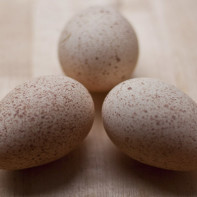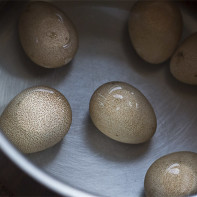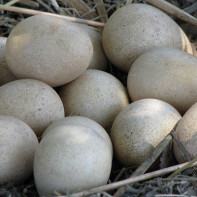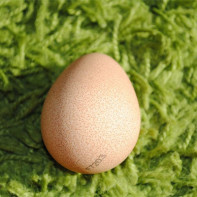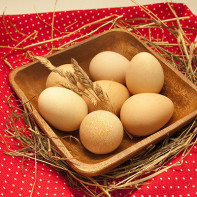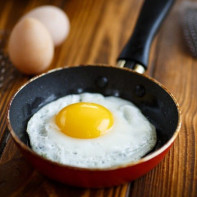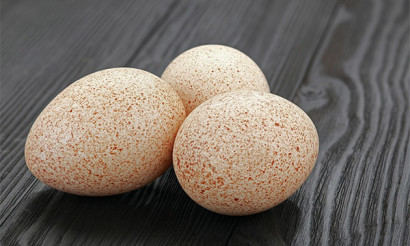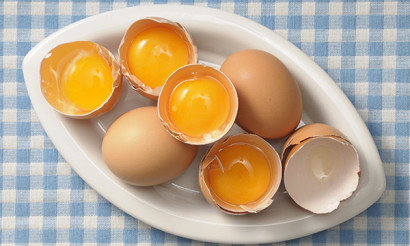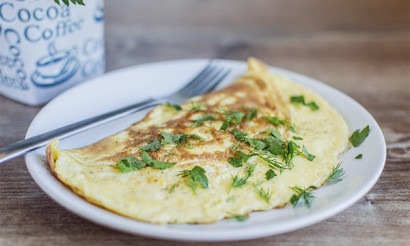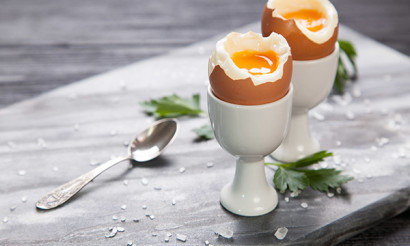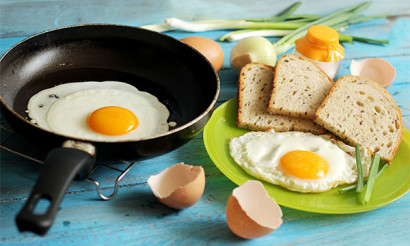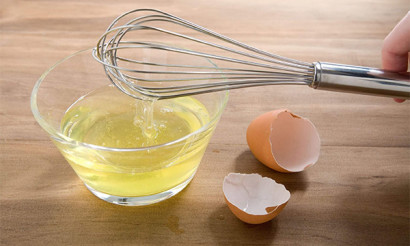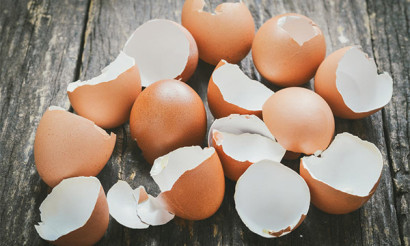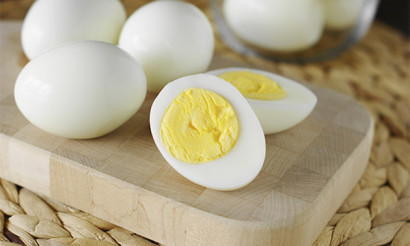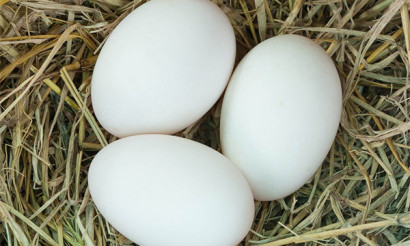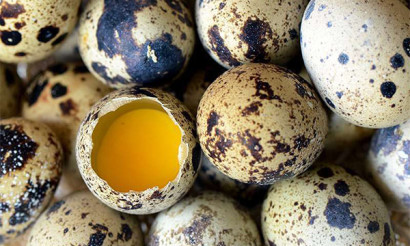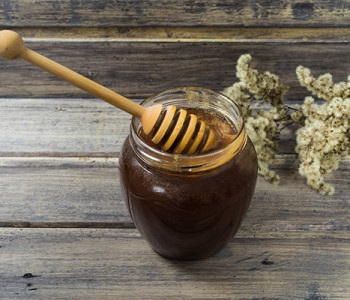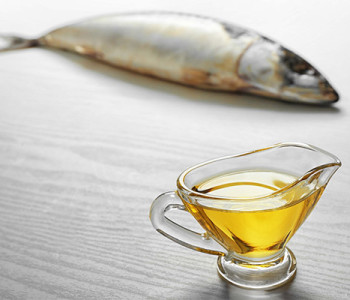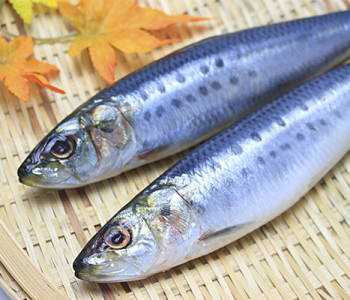Guinea fowl eggs: health benefits and harms
Guinea fowl has been known to mankind since ancient Roman times, but Africa, the peninsula of Madagascar, is considered its real homeland. Once in Russia, it began to be called the “royal bird”, because it was the most exquisite dish on the tables in noble houses. Her relatives are chickens, turkeys and quail. Compared to them, it can survive in heat at + 40 ° C and frost –50 ° C. Guinea fowl is also not demanding for food, unlike its relatives. Its diet can be Colorado beetles, slugs, flies, ticks, ants, but not plants.
- What do guinea fowl eggs look like?
- What is the difference between guinea fowl eggs and chicken
- Composition and calorie content
- Useful properties of guinea fowl eggs
- For women
- For men
- During pregnancy
- When breastfeeding
- For kids
- When losing weight
- Guinea fowl eggshell: properties and applications
- Caesar eggs in medicine
- The use of guinea fowl eggs in cosmetology
- Harm and contraindications
- How to choose and store guinea fowl eggs
- How to cook guinea fowl eggs
- Is it possible to eat raw
- Interesting facts about guinea fowl
Having become a poultry, the guinea fowl did not lose the features of the freedom-loving and authoritarian nature of its distant ancestors. She does not fly as well as she does. At the farm, the bird can take on the duties of a guard: a stranger, a dog or a cat will not pass by it, as they will surely be stopped or scared by the heart-rending cry of a guinea fowl.
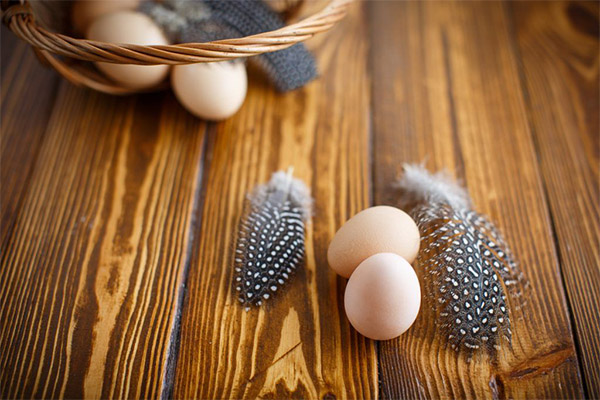
No less attractive in this bird is considered a very weak susceptibility to its salmonellosis and leukemia. Guinea fowl has dietary meat, in which there are few calories, but many useful trace elements. For six months, she lays eggs, which are considered hypoallergenic.
What do guinea fowl eggs look like?
The shape of guinea fowl eggs resembles a pyramid, because one of their ends is sharp and elongated. The location of the air chamber is a rounded region opposite the sharp end. The shell, sometimes up to 2 mm thick, is strong and hard: an egg thrown from a height of two meters can remain intact. The shell under the shell is also characterized by hardness and density.
There is no watery protein in the shell of the shell. It envelops a bright yellow, almost orange yolk.
The beige color and brown speckles on the shell along with the shape are the “signature” sign of guinea fowl eggs. Another feature of African chicken eggs is the roughness of the surface of the shell when felt.
What is the difference between guinea fowl eggs and chicken
The color, size and shape of chicken eggs and caesarines are much different than:
- Guinea fowl eggs are light brown in color with specks, whereas in chicken they are white or from bright brown to orange, depending on the diet.
- If guinea fowl eggs with a thick and strong shell, then the chicken shell is thin and fragile.
- The eggs of these two poultry differ in the structure of the shell: the number of air pores in guinea fowls is less than in their "relatives". Because the ingestion of harmful microorganisms inside is limited, not to say about chicken eggs.
- The size of the eggs of these two birds is also different: in the first they are smaller than in the second.
- There is a difference in form. A hint at a pyramid with an elongated top is a guinea fowl egg, an oval - chicken.
- The content of vitamin A in a guinea fowl egg is 2 times greater than that of chicken.
- There is a difference in shelf life. Room temperature allows you to store guinea fowl eggs for up to two months, and in the refrigerator for up to six months at a temperature of 10 ° C. They can not be frozen. While the shelf life of chicken eggs is 25 days at room temperature, and in the refrigerator - no more than 3 months.
Composition and calorie content
- Phosphorus, magnesium, potassium, calcium, iron - this is a list of the main trace elements in poultry eggs.
- Amino acids are mainly represented by methionine, glutamine, lysine, cystine, asparagine.
- The presence of vitamin A in the eggs guarantees an improvement in the condition of the skin, nails, hair, and vision.
- The functions of B vitamins are to generate energy from carbohydrates, proteins, fats. They support the vital activity of all systems and organs of the human body.
- Vitamin E, or tocopherol, which is a natural compound, affects the functioning of the genitals. It is a useful component among the means to help make a healthy baby.
- Vitamin D is a healthy development not only of the nervous system, but also of the immune, bone and endocrine glands.
In addition to the usual proteins, fats and carbohydrates, which are 12.9, 0.51 and 0.72 g in the “king bird” egg, respectively, it contains 70 g of water, 1.2 g of ash. Calorie content is 43 kcal.
Due to this unique and balanced composition of vitamins, amino acids, trace elements, the UN Food Commission, guinea fowl eggs are included in the list of products useful for human nutrition.
Useful properties of guinea fowl eggs
Caesar's egg is useful not only for being inside the hard shell, but also for the shell. So, in a yolk of an egg a decent amount of carotenoids, provitamin A, protein. The shell is a whole treasure of calcium, which is used in powdered form.
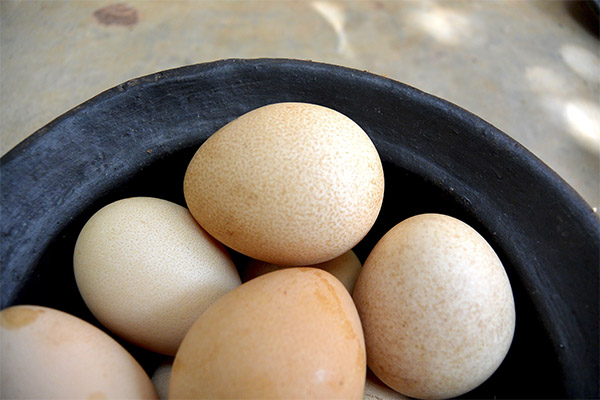
For women
Women do not prohibit the daily use of guinea fowl eggs by women because of their beneficial effects on their health. Skin, hair and nails will receive the necessary nutrients and will look healthy. Recipes of folk cosmetics recommend masks with different parts of the egg:
- Protein will help in reducing pores.
- The yolk will relieve oily sheen, give the skin elasticity and saturate it with the necessary vitamins and minerals.
- The crushed shell will help the skin of the body as part of scrubs and body wraps to get rid of obsolete cells.
The use of low-calorie guinea fowl eggs keeps women from overeating, because they provide a state of satiety, due to which normal body weight is normalized.
The rich protein composition of proteins contributes to the appearance of muscle tone. Regular use of caesar's eggs is an obstacle to the formation of a network of small blood vessels on the body, and reduces the risk of other diseases of the heart and blood vessels.
The beneficial substances in the eggs prevent the development of inflammatory processes. In diabetics, the body's response to insulin improves. The usefulness of the eggs of the “royal bird” is also manifested in their ability to prevent the appearance of malignant tumors in the form of tumors.
For men
In addition to the proteins necessary for the male body, the composition of guinea fowl eggs is rich in vitamins that improve potency.
Retinol, pyridoxine, tocopherol, riboflavin, calciferol and pantothenic acid, which are contained in the protein and yolk, are necessary for the full functioning of the organs of the male reproductive system. According to urologists, the daily intake of a pair of guinea fowl eggs maintains a satisfactory quality and quantity of ejaculate.
The male body is not capable of producing certain types of amino acids that are found in eggs. An insufficient amount of these amino acids can worsen not only the physical condition of a man, but also reduce libido. Therefore, the use of guinea fowl eggs by men is a guarantee of good health and fitness.
During pregnancy
Among different species, a caesar egg is considered the most useful for women during pregnancy. This is due to:
- Its hypoallergenicity, that is, a low probability of an allergic reaction.
- The presence of antibacterial properties in the protein.
- The presence of many vitamins in the yolk, with a predominance of carotenoids.
- No risk of bacteria entering the egg causing salmonellosis and leukemia.
Caesar eggs are important for the body of a pregnant woman. Their beneficial substances are necessary during the formation of the fetus.
When breastfeeding
African chicken eggs are recommended for women during breastfeeding due to the presence of many components necessary for the mother and child body. Hypoallergenic product is another big plus.
For kids
The presence of vitamins, amino acids, trace elements and antioxidants in guinea fowl eggs makes them an important product in the diet of children.
Regular use of the product:
- strengthens the skeleton of a child;
- establishes the thyroid gland, liver and kidneys;
- beneficial effect on the functioning of the brain, strengthening memory;
- improves digestion.
When losing weight
Guinea fowl eggs can be one of the main universal products if a person is overweight. They have so few fats and calories that their consumption in food does not lead to an increase in extra pounds, but rather causes a feeling of satiety. Digestibility is almost 100% - this is the main advantage of the eggs of the "royal bird" as a dietary product.
Two eggs of this bird are enough to saturate a healthy human body with the necessary amount of protein and the minimum - fat.
One of the features of African chicken eggs is the absence of cholesterol, which is why they are very useful for children and the elderly.
Guinea fowl eggshell: properties and applications
A feature of guinea fowl eggs is the usefulness of not only its internal content, that is, protein and yolk, but also the shell. Its use in powder form can serve different purposes: filling the lack of calcium in the body, strengthening the skeleton and nervous system, treatment of vitamin deficiency.
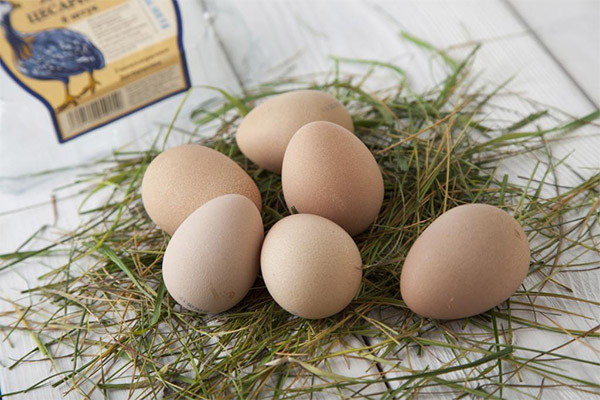
Iron, molybdenum, sulfur, phosphorus, zinc, silicon - the presence of these trace elements in the shell makes it a universal supplier to the body of useful substances necessary for its functioning.
In order for the shell of the “royal bird” to acquire healing qualities and not to harm, it must be cleaned of cooked and chilled eggs. Then boil twice for at least 5 minutes. You can limit yourself to one, but longer boiling of the shell, at least 7 minutes. The shells milled in a mortar or ground in a coffee grinder are considered ready for use. Daily use of the powder in one teaspoon with water will not only replenish the calcium content in the body, but also strengthen bones, skin and hair.
The shell of an African chicken is organic calcium. Using crushed shell powder, a person carries out preventive work that is invisible to himself to reduce the likelihood of osteoporosis or other skeleton diseases.
Compared to synthetic, the calcium contained in the shell can be completely processed. However, excessive consumption of crushed shells can have the opposite effect. Therefore, the recommendations of specialists and breaks between receptions of such a tool are required.
Caesar eggs in medicine
- The healing properties of guinea fowl eggs have long been known to medical experts. The presence in them of a predominant, in comparison with many substances, iron makes the product useful for the treatment of anemia.
- The lack of vitamins will make up for the regular, but not excessive, inclusion of this product in the diet. Stress, loss of strength and disturbances in the functioning of the nervous system are one of the reasons for consuming Caesar eggs in recommended doses.
- The stomach and digestive organs normalize their work if vitamins, amino acids, and trace elements get into the body in sufficient quantities.
- The inability to obtain the desired body shape is often caused by metabolic disorders in the body. Guinea fowl eggs are one of those products that will play a positive role in restoring the metabolic functions and getting rid of unnecessary weight.
- Pregnancy and lactation, the postoperative period are associated with the need to restore physical strength and balance of nutrients in the body. At this time, do not neglect the advice of specialists recommending the inclusion of African chicken eggs in the diet.
Baby nutrition, according to nutritionists and pediatricians, should be supplemented with this product, which has in its composition a whole treasure of useful substances necessary for the child.Any person can feel the therapeutic effect on the body, including in the daily diet only a couple of caesar eggs.
The use of guinea fowl eggs in cosmetology
Beauty is also interested in using guinea fowl eggs. On its basis, cosmetics are prepared or combined with others, because they reduce or completely eliminate the allergic reaction of a particular cosmetic product.
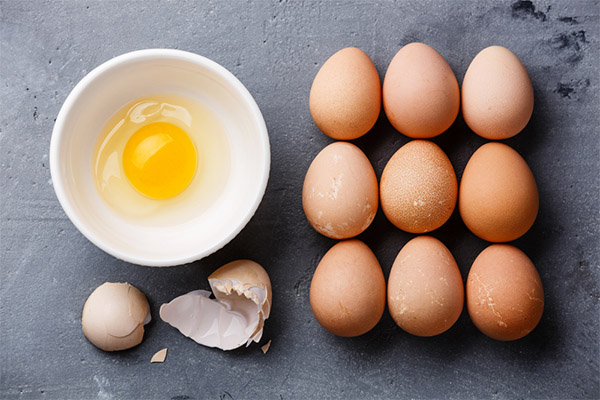
- African bird eggs can become the basis of a cleansing and moisturizing mask for the body and hair, scrubs and body wraps, even at home. The shell of this product as part of a scrub will give freshness to the skin. To do this, it is enough to add the powder obtained after grinding in a coffee grinder to any gel for washing or for showering. To make the result more effective, the gel can be replaced with cream. It is not recommended that only such a gel be applied to the area around the eyes where the skin is more delicate - it can get damaged even from microparticles of the eggshell.
- A mask from a yolk of a caesar egg and oatmeal will help get rid of the oily sheen of the face.
- To obtain elastic skin, you can use whipped yogurt with a guinea fowl egg and two drops of pharmacy tocopherol, that is, vitamin E. 20 minutes of the mixture under a plastic wrap will make the skin of the body more elastic.
- An egg mask with onions will help strengthen hair. It needs to be washed off only with cold water. When using warm water, proteins stick to your hair.
Harm and contraindications
- The usefulness of caesar's eggs is reduced to "no" with abuse.
- Due to their excessive nutrition, there is a danger of a negative effect of the product on unhealthy kidneys and liver.
- Categorically it is impossible to use a product with individual egg intolerance.
How to choose and store guinea fowl eggs
- When choosing, the appearance is taken into account: the absence of cracks and rattling sound when shaking.
- It’s good to have information about the diet of birds: eating guinea fowl with natural products improves the quality and taste of eggs.
- In addition, it is important to pay attention to the form. The correct shape of the eggs of the “king-bird” is pear-shaped, the color is from light to dark brown.
- A strong shell is its integrity after tapping a pair of eggs against each other.
Guinea fowl eggs can be stored for up to 6 months. In this not the last role is given to a strong and thick shell. Such a long shelf life is ensured at a temperature of 0–10 ° C. Up to two months will reduce egg storage time at 15–18 ° C. Even a machine can become a place to store African chicken eggs for up to 28 days. Travelers, truckers, fishermen, hunters prefer to take this product on trips and trips.
If there is a need to preserve eggs for a long time, you need to use the method of shell lubrication with melted fat or paraffin.
Folded in a cardboard box with the sharp end down and covered with grain or salt, caesar eggs can also be stored for more than the specified time in a cellar with a temperature not exceeding 15 ° C.
They do not recommend freezing the product - it will lose its properties.
How to cook guinea fowl eggs
This product is boiled longer than chicken eggs, due to the dense and thick shell. The “hard-boiled” state for guinea fowl eggs will occur in 10–11 minutes, and the “soft-boiled” - 3-4 minutes.
Is it possible to eat raw
An egg of an African chicken in its raw form is fully absorbed by the body in the morning, that is, in the morning. Moreover, the quantitative norms of use are the same - no more than two. A person gets much more benefit from raw eggs than from boiled or fried eggs.
Interesting facts about guinea fowl
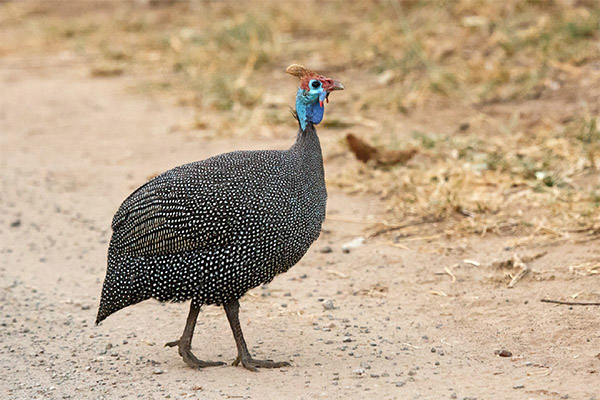
- The scope of guinea fowl eggs is extensive. This is cooking, medicine, cosmetology. So, with this product you can cook salads, snacks, pastries, desserts. The color of the dishes will be brighter due to the brightness of the yolk.
- Fresh eggs or soft-boiled eggs are more beneficial to the body than hard-boiled ones.
- Cosmetology uses the outer shell of a guinea fowl egg and its internal content.
- Guinea fowl in terms of prevalence in the US is ahead of turkeys and chickens. Because there caesar eggs are cheaper and more affordable than, for example, in Russia.
- The bird answers the owners who care for it with confidence. But strangers or animals will not be able to pass them unnoticed due to their loud and heart-rending cry.
- Guinea fowl can help in the fight against harmful insects, for example, Colorado beetles, eating them.
- Guinea fowl is a flock of birds living in a group where from 20 to 30 individuals. Therefore, being alone, she screams very loudly. The causeless cry of a bird is proof of its special dominant position over other representatives of birds.
- To catch a guinea fowl, you must use a special bedspread or net. She can sacrifice her feathers or tail and run away if she grabs them. You can hold it by wings or paws.
- They are not fans of flying. Guinea fowls basically move in steps, but run well in case of danger.
- Guinea fowl are not very "responsible" hens because of shyness, so chicks are usually hatched using an incubator.
- Feathers of any kind of this bird are used to make jewelry. Few people know that the source material of false eyelashes is feathers of a guinea fowl. The manicure service also uses caesar feathers.
Guinea fowl in all respects - an amazing bird. This gentle plumage, and interesting behavior, and an unusually rich content of valuable substances in meat and eggs, listed in the list of healthy foods for humans.
«Important: all information on the site is provided exclusively in fact-finding purposes. Before applying any recommendations, consult with a profile specialist. Neither the editors nor the authors are liable for any possible harm caused materials. "

